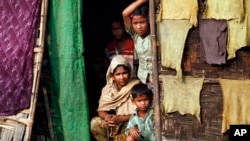BANGKOK —
The U.N.’s Special Rapporteur for Human Rights to Burma is urging the government to allow foreign aid workers to return to Rakhine state. The workers were evacuated last month because of ethnic unrest, but the U.N. warns their departure has led to severe consequences for at least 140,000 displaced people living in temporary camps.
U.N. spokesperson Pierre Peron said time is running out for the 140,000 people displaced by violence who are living in camps.
"We have people who will run out of food in the next two weeks if we can't distribute food to the camps," he said. "We have a peak in the dry season at the moment and water levels are running very low and we need to be able to bring water to people who need it and most importantly people need to have access to health services and at the moment emergency health cases are not being referred to the hospitals simply because the NGOs are not there."
For years, international rights groups have criticized government policies that deny the Rohingya citizenship, and restrict their travel.
During the past two years, ethnic and religious tensions have led to violence between the Muslim Rohingya and Buddhist Rakhine communities in Rakhine state. Hundreds of thousands of Rohingya have fled their homes for temporary camps, where they depend on international aid for survival.
Foreign aid groups were forced to leave in March after violent mobs attacked some offices. Tomas Quintana, the U.N.'s Special Rapporteur for human rights to Burma, warned that an impending humanitarian crisis now looms.
This is the second time Quintana has raised the possibility of crimes against humanity in Rakhine state, but Burmese officials contacted by VOA declined to respond to the claim.
On Monday, a senior member of the British Foreign Office, Hugo Swire, met Burma's ambassador in London to raise concerns about humanitarian aid.
Joseph Fisher, a spokesperson for the British embassy in Rangoon, said Swire hopes to urge the government to fully restore humanitarian aid.
"As a result of those developments hundreds of thousands of people in Rakhine state mainly from the Rohingya community are not receiving vital and medical and humanitarian aid," he said. "So the minister, in his discussions with the ambassador, called on the Burmese government to urgently restore humanitarian access to all communities in need and to ensure the security of aid workers and all communities in Rakhine state."
Last week, U.S. Department of State spokesperson Marie Harf urged the Burmese government to rescind travel restrictions placed on aid workers. Burma claimed these were in place for the safety of aid workers.
A government investigation into the attacks in Sittwe was scheduled to present its findings to the president Monday, but the government has yet to announce the commission's findings.
U.N. spokesperson Pierre Peron said time is running out for the 140,000 people displaced by violence who are living in camps.
"We have people who will run out of food in the next two weeks if we can't distribute food to the camps," he said. "We have a peak in the dry season at the moment and water levels are running very low and we need to be able to bring water to people who need it and most importantly people need to have access to health services and at the moment emergency health cases are not being referred to the hospitals simply because the NGOs are not there."
For years, international rights groups have criticized government policies that deny the Rohingya citizenship, and restrict their travel.
During the past two years, ethnic and religious tensions have led to violence between the Muslim Rohingya and Buddhist Rakhine communities in Rakhine state. Hundreds of thousands of Rohingya have fled their homes for temporary camps, where they depend on international aid for survival.
Foreign aid groups were forced to leave in March after violent mobs attacked some offices. Tomas Quintana, the U.N.'s Special Rapporteur for human rights to Burma, warned that an impending humanitarian crisis now looms.
This is the second time Quintana has raised the possibility of crimes against humanity in Rakhine state, but Burmese officials contacted by VOA declined to respond to the claim.
On Monday, a senior member of the British Foreign Office, Hugo Swire, met Burma's ambassador in London to raise concerns about humanitarian aid.
Joseph Fisher, a spokesperson for the British embassy in Rangoon, said Swire hopes to urge the government to fully restore humanitarian aid.
"As a result of those developments hundreds of thousands of people in Rakhine state mainly from the Rohingya community are not receiving vital and medical and humanitarian aid," he said. "So the minister, in his discussions with the ambassador, called on the Burmese government to urgently restore humanitarian access to all communities in need and to ensure the security of aid workers and all communities in Rakhine state."
Last week, U.S. Department of State spokesperson Marie Harf urged the Burmese government to rescind travel restrictions placed on aid workers. Burma claimed these were in place for the safety of aid workers.
A government investigation into the attacks in Sittwe was scheduled to present its findings to the president Monday, but the government has yet to announce the commission's findings.




